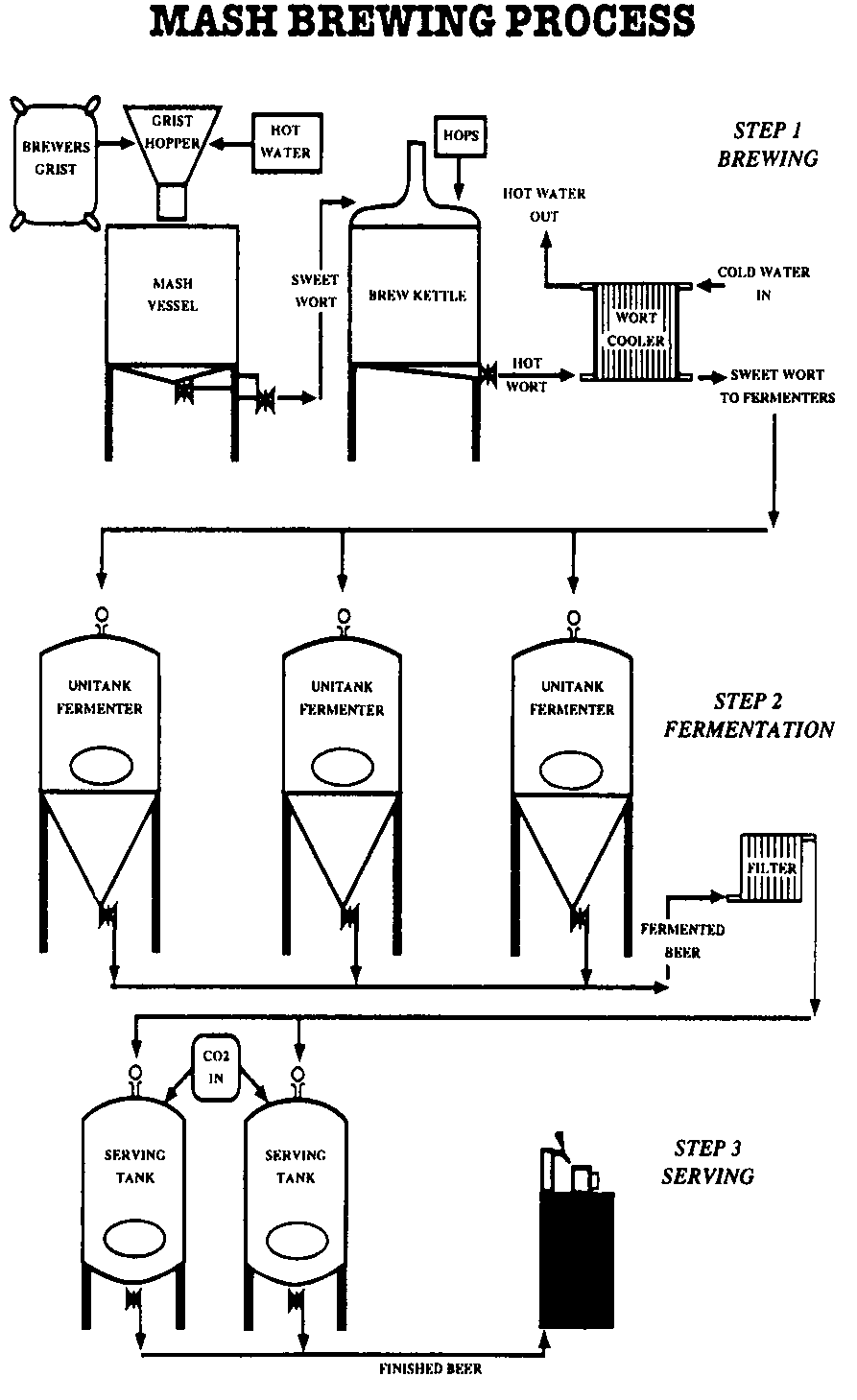
The Brewing Process
Sometimes called 'liquid bread", beer is made from basic, healthy ingredients: barley, yeast, water and hops - nothing more!
Malted barley is used instead of raw barley because its nutrients are more easily extracted in the brewing process.
All brewing occurs in specially designed brewing vessels which are made to exacting specifications from high quality stainless steel.
Brewing may be regarded as three separate processes: Brewing, Fermentation and
Finishing.
Brewing
THE MASH
Mashing is the process of extracting sugars and nutrients from malted barley.
At Riverwalk Brewery, we employ an age-old process called infusion mashing, which is widely used in Britain.
Infusion mashing combines ground grains into a mash tun to form a mixture which looks and tastes like sweet cooked cereal!
For 90 minutes, the mash is allowed to "sit" so enzymes naturally present in the malted barley can break down barley starches into
simple sugars and amino acids which yeast can ferment. For every mash, our brewmaster blends several hundred pounds of the finest
pale and selected specialty malts to lend our beer a distinctive color and richness - corn or rice are never used!
LAUTERING
Our mash tun is specially designed with a fake bottom which allows us to strain out a clear, sweet-tasting liquid extract in a
process called lautering. During lautering, the grains are simultaneously rinsed with hot water to recover all remaining extract.
The extract, or sweet wort, is then transferred to the brew kettle to be boiled, while the "spent grain' is given to Farmer Jack's cows!
THE BOIL
The purpose of the boil is to bitter the wort through the addition of hops. Hops are the green, leafy, cone-like
flowers of the hop vine which contain bittering resins as well as aromatic oils which impart floral, spicy, or even fruity aromas to beer! A variety of
domestic and imported hops are blended by our brewmaster to match the style and drinkability of each of our brews. The boil
lasts just over an hour, and when complete, the bittered, 200-degree wort is cooled with ice cold brewing water through a heat
exchanger. In all, the brewing process takes only 10 hours.
Fermentation
Fermentation is a process where yeast "eat" the extracted sugars to produce alcohol, carbon dioxide, and flavor by-products.
Our fermenters are specially equipped with cones at the bottom which
accelerate fermentation, while enhancing yeast settlement and yeast
recovery. We use a specialized, top-fermenting yeast which is
cultivated and repitched from brew to brew. For seven days our beer
is fermented at a cool 65 degrees Fahrenheit, followed by a maturation process which induces a slow fermentation at
near-freezing temperatures for nearly a month. This cold fermentation, called lagering, is used to develop natural carbonation.
Like in champagne, natural carbonation in beer produces fine bubbles for a more palatable flavor and a smooth, creamy head!
Finishing
At Riverwalk Brewery, we keep our beer as natural, wholesome, and healthy as possible by only filtering out the yeast
which would make your beer cloudy, while retaining the beer's full flavor. Upon filtration, the crystal clear beer is
transferred to one of our holding tanks where it is kept ice-cold and dispensed directly to your glass!
We strictly avoid exposing our beer to heat through pasteurization, or using flavor or color enhancers which can damage beer quality.
Only the finest ingredients, malt from Wisconsin, hops from Europe and Washington state's Yakima Valley, specially cultivated yeast,
and crystal clear brewing water combine to form the quality of product in each glass of beer we serve.
At Riverwalk Brewery, we believe our strict adherence to age-old tradition and honest work is the true recipe for the
most flavorful, freshest, and most satisfying beer you've ever tasted. Because we brew in small batches, we are able to offer
a wide selection of traditional beer styles throughout the year. Check your beer menu for our latest flavors!
This document was placed here on Dec 5, 1996, and has been viewed countless times.
